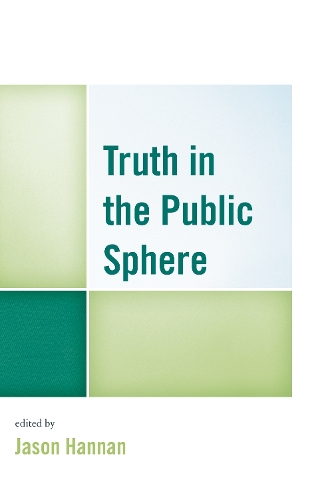
Truth in the Public Sphere
(Paperback)
Available Formats
Publishing Details
Truth in the Public Sphere
By (Author) Jason Hannan
Contributions by David I. Backer
Contributions by Chris Balaschak
Contributions by Makeda Best
Contributions by Charles Bingham
Contributions by Christopher Gilbert
Contributions by Lewis A. Friedland
Contributions by Francis Halsall
Contributions by Jason Hannan
Contributions by Thomas Hove
Bloomsbury Publishing PLC
Lexington Books
15th September 2018
United States
Classifications
Professional and Scholarly
Non Fiction
302.201
Physical Properties
Paperback
242
Width 151mm, Height 222mm, Spine 20mm
508g
Description
Has truth become a casualty of Americas increasingly caustic and volatile political culture Truth in the Public Sphere seeks to understand the significance of truth for the everyday world of human communication. To this end, this book explores the place of truth in several facets of the public sphere: language, ethics, journalism, politics, media, and art. Featuring an international group of contributors from across the humanities and social sciences, this collection is a definitive supplement to theoretical debates about the meaning and status of truth.
Reviews
In short, the authors of this book succeed in presenting the truth in different contexts communication, but also according to a variety of media (traditional and digital). [Translated from original French] * Communication *
This is a splendidly feisty, well-researched, passionately argued, and urgently topical book. It stands foursquare in the great tradition of radical social critique that has long played a notable part in U.S. political debate and the revival of which has never been more desperately needed than at present. The editor and contributors do a fine job in dissecting the lies, deceptions, hypocrisies, corruption, criminality, and sheer stupidity that have typified the conduct of successive administrations over the past three decades and more. Writing in the shadow of Donald J. Trumps emergence as a presidential candidate they anatomize these features of policy and public discourse from a range of well-chosen philosophical perspectives which lay bare the depth and extent of the rot that has done so much to undermine the basic decencies of civic and political life. A courageous, bracingly intelligent collection that deservesindeed demandsa large readership within and beyond the U.S. academy. -- Christopher Norris, distinguished research professor at Cardiff University, Wales
Truth in the Public Sphere makes an important and timely intervention in debates about the accountability of political discourse to citizens truths. Avoiding the simple realism/relativism binary and the rationalism that has characterized public sphere theory, the contributors (who are top scholars in the field) convincingly make the case for the study of the pragmatics of truth from below. This book also features innovative work on the affordances of corporeality, aesthetics, and affect in unconventional and creative ways to theorize and enact truth. It includes compelling case studies from art, history, education, journalism, public relations, mass communication, and rhetorical studies, enabling an interdisciplinary conversation about one of the most urgent questions of our time. -- Dana L. Cloud, Syracuse University
What is truth This book is a good place to stay for an answer. Not to resolve the direct question, but rather to take up important issues that define and test public thought. By starting with the paradox that truth is indefinable yet indispensable, the authors articulate a strong network of concepts and claims for understanding contemporary media practices. Struggle and agreement, facts and authenticity, candor and shamelessness, clarity and affinity: these and other elements of public culture are brought to the light that truth promiseseven as it also obscures them. -- Robert Hariman, Northwestern University
What is truth This collection is a good place to stay for an answer. Not to resolve the direct question, but rather to take up important issues that define and test public thought. By starting with the paradox that truth is indefinable yet indispensable, the authors articulate a strong network of concepts and claims for understanding contemporary media practices. Struggle and agreement, facts and authenticity, candor and shamelessness, clarity and affinity: these and other elements of public culture are brought to the light that truth promiseseven as it also obscures them. -- Robert Hariman, Northwestern University
Author Bio
Jason Hannan is assistant professor in the Department of Rhetoric, Writing, and Communications at the University of Winnipeg.
